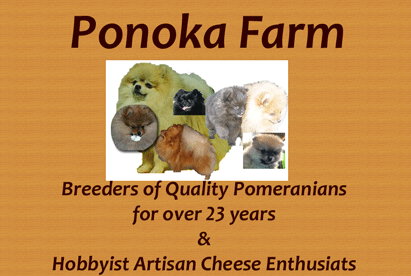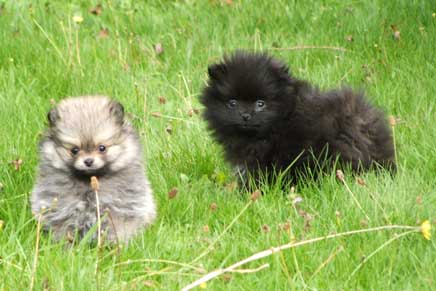Caring for your Pomeranian
It is always a good idea to get sorted before you bring your puppy home.
Food
- We feed a balanced dry dog food. There are many brands available. I recommend Royal Canin or Nutrience. At this age puppies need 1/3 -2/3 of a cup per day. If you decide to change the diet do so gradually by introducing the new food mixed with the old. This will help to prevent upset stomachs and possible diarrhoea.
- DO NOT, I repeat DO NOT feed your puppy table scraps. Small dogs like poms are sensitive. If fed table scraps, your puppy can have tooth problems, health problems and will likely become overweight. Occasional treats are fine but limit the amounts and frequency. Treats such as dog biscuits, liver or cheese are ok, human biscuits etc are not. Some treats I use are Smackos (they do love them) and pigs ears. Do not give pressed rawhide treats. They are usually coloured red or green or yellow and have lots of little pieces pressed together. I have had intestinal problems in the past with these.
- Be sure that your Pomeranian has clean, fresh water and a food supply at all times during the day. Puppies needed to be able to replenish but as they get older you can put puppy onto a timetable.
- Your dog's teeth will be healthier with dry food.
- Do not give cow's milk. This can upset your puppies stomach.
- Persistent diarrhoea, a pot belly, or thinness can be a sign of worms.
Bedding
- Puppies need to have there own sleeping space. I suggest you provide puppy with a secure bed such as a crate. Your puppy may whine or cry at night at first. When they have been separated from their mother & family and this can be disturbing at first. Do not give in and let puppy sleep with you. Reassure puppy and if it persists ignore puppy. Your Pomeranian puppy should settle fairly quickly. A toy in his bed can also help.
Toys
- Puppies love to play and chew. Pig Ears, chew bones and toys are recommended to help clean your puppy's teeth. Toys keep puppy occupied when you are away as well as active. Toys such as a Kong (bounces all over) or rope toy are good for keeping puppy occupied when you first leave her by herself. A bit of peanut butter or butter on the inside will keep puppy happy for a long time and is useful when first leaving puppy at home.
- Also give your puppy a small stuffed toy right away. It will comfort your puppy when you are away. Be sure that the toy has no pieces that could be chewed off and choked on.
Training
- Avoid yelling at your puppy. A sharp "no" is all that is needed when she does something wrong. Yelling at or hitting your puppy will give her a low self esteem, and will inhibit the development of your puppies personality.
- House training. Poms are very smart and easy to house train if you are strict and persistent in your method. Do not allow the puppy to wander the house during this time. When she cannot be watched, place her in her crate or a puppy play pen. No, this is not cruel. Dogs do not resent being in a crate for the night and for limited times during the day. In time, your puppy will actually enjoy his crate as his den and come to know it as his/her safe place.
- Take puppy outside in the morning, after meals, and after naps. Praise her when she eliminates correctly. If you see her squatting or hunching her back to eliminate in the house, tell her loudly and sharply, "NO!" and take her outside. Praise her when she eliminates correctly. If she does manage to eliminate in the house, clean the spot with white vinegar or an odour cleaner or she will be attracted to it again.
Exercise & Daily Care
- Poms like to be the centre of attention when with their families. Give them plenty of love and attention and your puppy will blossom.
- Avoid leaving her/her alone for extended periods of time. Make sure to allow her plenty of exercise. A secure back yard allows puppy to play and exercise at the same time. Pomeranians love to be outside.
- Check that there are no small objects around your home that can be choked on or electrical cords that can be chewed.
- Also make sure that any puppy pens or fencing have small enough bar spacing so that your puppy cannot get his head through and get stuck or injured.
- Walk your dog only on a lead.
- Be careful not to drop your puppy or allow small children to carry her around. Remember they are dogs not toys and can be broken.
- Companionship. Although it is not necessary, Poms do enjoy having another dog around for company. It is better to obtain the companion while your dog is still young. (Although a Pom of any age will usually accept a new puppy, as long as the original pet still gets attention).
Health Care
- It is recommended that pet dogs be spayed or neutered.
- Be sure to keep your Pomeranian puppy's vaccinations current. Common dog illnesses are easy to prevent, but very hard to cure.
- Your puppy will have been wormed and had its first shots. In two-three weeks she should be taken for his second shot, and re wormed. A final set of shots should be given after 16 weeks of age and an annual booster given thereafter.
Grooming
- Practice good grooming. A Pom is easy to groom and only needs brushing every few days. Use a slicker brush when grooming out knots, undercoat or debri from the coat.
- Use a pin brush for long hair and a small slicker or comb for behind the ears.
- Brush in sections, against the grain (from tail to head) so that the coat will not lay flat.
- To avoid mats, brush all the way to the skin carefully removing all loose undercoat.
- Clip nails regularly and be careful to avoid cutting the quick. Taking your Pomeranian for walks along concrete paths will help file nails down and keep them short.
- Use a good quality shampoo when bathing. When applying the shampoo water it down in a bottle. This makes it easier to wash your Pomeranian as well as rinsing it off. Shampoo left on the coat or skin will irritate the skin and cause dandruff.
- CAUTION: Brush your Pom thoroughly BEFORE bathing. Knots and mats are difficult to get out when the coat has been wet and then dried.
- If your dog is blowing undercoat or moulting (it is all falling out in lumps), and you do not brush it out before bathing, the water and shampoo will cause your dog to mat severely.
- In cool weather, dry your dog completely so she will not chill. You can get your puppy use to a hair dryer.
- After bathing, trim the hair between the toe pads and clip up to the first joint of the leg and around the edges of the feet so that they look like tidy "cat's feet."
- Trim unruly hair from the top of the ears by protecting the ear leather with two fingers and cutting straight across the top of the ear with the other hand. Use caution until you are experienced with this or you may cut the ear leather.
- You can also for sanitary reasons, clip a small circle around the back end regularly.
- Around 12 weeks old, most Poms begin a stage called "puppy uglies." As the baby coat begins to transition over to adult coat, your puppy will look rather scruffy and gangly. Depending on the puppy, she will begin to coat up and her features soften again at 6-9 months. During this stage it is important to keep your puppy well groomed, particularly exercising care to brush out all loose undercoat to avoid matting. Don't let anyone laugh at your puppy.
ENJOY YOUR PUPPY!


